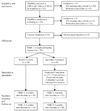Parenting intervention for externalizing behavior problems in children born premature: an initial examination
- PMID: 20375736
- PMCID: PMC2866142
- DOI: 10.1097/DBP.0b013e3181d5a294
Parenting intervention for externalizing behavior problems in children born premature: an initial examination
Abstract
Objective: To examine the initial efficacy of parent-child interaction therapy (PCIT) for treating behavior problems in young children who were born premature.
Method: In this randomized, controlled trial, 28 children between the ages of 18 and 60 months, who were born <37 weeks gestation and presented with clinically significant externalizing behavior problems, were randomly assigned to an immediate treatment (IT) or waitlist (WL) control group.
Results: After 4 months, children who received PCIT were reported by their mother to have less attention problems, aggressive behaviors, and externalizing and internalizing behavior problems, and they were observed to be more compliant to maternal commands than children in the WL group. In addition, mothers in the IT group interacted more positively with their child, reported lower parenting stress related to difficult child behavior and demonstrated improved parenting practices compared with WL mothers. Behavior change maintained for 80% of the IT children 4 months after treatment completion.
Conclusions: This study demonstrates preliminary efficacy of PCIT for the treatment of behavior problems in young children who were born premature.
Figures
References
-
- Berman RE, Butler AS. Preterm Birth: Causes, consequences, and Prevention. Washington, DC: National Academies; 2006. - PubMed
-
- Bhutta AT, Cleves MA, Casey PH, Cradock MM, Anand KJ. Cognitive and behavioral outcomes of school-aged children who were born preterm: a meta-analysis. JAMA. 2002;288:728–737. - PubMed
-
- Aylward GP. Cognitive and neuropsychological outcomes: more than IQ scores. Ment Retard Dev Disabil Res Rev. 2002;8:234–240. - PubMed
Publication types
MeSH terms
Grants and funding
LinkOut - more resources
Full Text Sources
Medical



